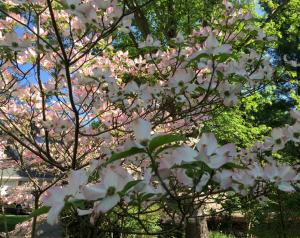 The iron ticking of the cosmic clock sounds like futility. Friends die or fade away; projects and accomplishments that once seemed so urgent look less and less meaningful; our bodies betray our infinite desire. Inexorable entropy. Yet there is a possible dawn in each moment, wherein God the Father might still surprise us. And no matter how hard life may be, spring has a way of stoking the hopeward embers of even the brokenhearted.
The iron ticking of the cosmic clock sounds like futility. Friends die or fade away; projects and accomplishments that once seemed so urgent look less and less meaningful; our bodies betray our infinite desire. Inexorable entropy. Yet there is a possible dawn in each moment, wherein God the Father might still surprise us. And no matter how hard life may be, spring has a way of stoking the hopeward embers of even the brokenhearted.
Paternal providence works this Easter miracle through maternal care, and that is why May is Mary’s month. There is that poem by the Jesuit priest, Gerard Manley Hopkins, “The May Magnificat,” a microcosmic spring which might uncoil to rejuvenate a weary reader.
He provides two answers as to why May is Mary’s month. The first:
Ask of her, the mighty mother:
Her reply puts this other
Question: What is Spring?—
Growth in every thing—Flesh and fleece, fur and feather,
Grass and greenworld all together;
Star-eyed strawberry-breasted
Throstle above her nestedCluster of bugle blue eggs thin
Forms and warms the life within;
And bird and blossom swell
In sod or sheath or shell.All things rising, all things sizing
Mary sees, sympathizing
With that world of good,
Nature’s motherhood.Their magnifying of each its kind
With delight calls to mind
How she did in her stored
Magnify the Lord.
So, May is Mary’s month because life is rising within the gestational, and capacitating, ambit of mother nature. Within this caring world-wideness, there is a different measure of moving bodies: the irrepressibility of new life, and of life’s growth and renewal. Life’s ambition to be more—to be all, within the all. The magnanimity of the world.
By having chosen to welcome the growing of God within her, Mary feels within herself, most intimately, what happens in nature’s mothering.
Hopkins does not leave it there, though:
Well but there was more than this:
Spring’s universal bliss
Much, had much to say
To offering Mary May.When drop-of-blood-and-foam-dapple
Bloom lights the orchard-apple
And thicket and thorp are merry
With silver-surfèd cherryAnd azuring-over greybell makes
Wood banks and brakes wash wet like lakes
And magic cuckoocall
Caps, clears, and clinches all—This ecstasy all through mothering earth
Tells Mary her mirth till Christ’s birth
To remember and exultation
In God who was her salvation.
Ecstatic bliss amidst the luminosities of early spring.
I couldn’t find “greybell.” I suppose it’s a flower, but the image that comes to me is of a cloudy sky giving way to high Marian blue, and sunlight deluging terrestrial surfaces in liquid electrum.
A riot of heaven breaking out on earth: that’s what Mary makes possible. She smiles, and like the smile that ends Fellini’s La Dolce Vita, it’s a smile that eclipses all the sorrows and hells of worldly existence. The Woman clothed with the sun remembers for us: the good Father loves each of us, passionately, with a love that never wants to give up, outlasting every winter. There are days in May when one may hope again.












